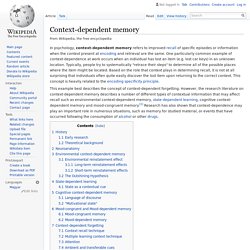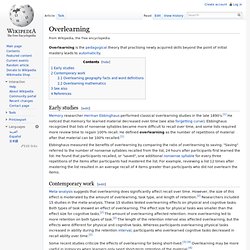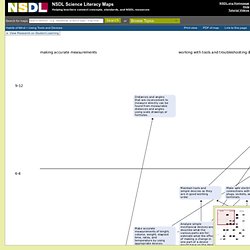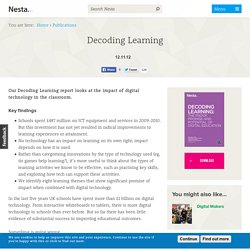

Context-dependent memory. This example best describes the concept of context-dependent forgetting.

However, the research literature on context-dependent memory describes a number of different types of contextual information that may affect recall such as environmental context-dependent memory, state-dependent learning, cognitive context-dependent memory and mood-congruent memory.[1] Research has also shown that context-dependence may play an important role in numerous situations, such as memory for studied material, or events that have occurred following the consumption of alcohol or other drugs. History[edit] Early research[edit] Some of the earliest research on this topic was conducted by researchers in the 1930s who analyzed how changes in context affect an individual’s memory for nonsense syllables.[2][3] These early studies were unable to demonstrate an effect of context-dependent memory.
Theoretical background[edit] Context effects do differ when it comes to what sort of task is being performed. Overlearning. Overlearning is the pedagogical theory that practising newly acquired skills beyond the point of initial mastery leads to automaticity.

Early studies[edit] Memory researcher Herman Ebbinghaus performed classical overlearning studies in the late 1890's.[1] He noticed that memory for learned material decreased over time (see also forgetting curve). Ebbinghaus recognized that lists of nonsense syllables became more difficult to recall over time, and some lists required more review time to regain 100% recall. He defined overlearning as the number of repetitions of material after that material can be 100% recalled.[1] Ebbinghaus measured the benefits of overlearning by comparing the ratio of overlearning to saving.
Contemporary work[edit] Meta-analysis suggests that overlearning does significantly affect recall over time. Overlearning geography facts and word definitions[edit] Overlearning mathematics[edit] See also[edit] References[edit] ^ Jump up to: a b Murphy, Gardner (1929). Home Cmap - What is CmapTools? Habits of Mind > Using Tools and Devices. NSDL Science Literacy Maps are a tool for teachers and students to find resources that relate to specific science and math concepts.

The maps illustrate connections between concepts as well as how concepts build upon one another across grade levels. Clicking on a concept within the maps will show NSDL resources relevant to the concept, as well as information about related AAAS Project 2061 Benchmarks and the Next Generation Science Standards. Next Generation Science Standards corresponding to Benchmarks for Science Literacy are now available in selected SLM Benchmarks. Find out more about the crosswalk developed between AAAS benchmarks and the Next Generation Science Standards (NGSS). Comments and Feedback We'd love to hear your comments and feedback. Acknowledgements NSDL Science Literacy Maps were created by the NSDL using the Strand Map Service (SMS).
This tool works on Windows and Macintoch PCs with recent versions of Internet Explorer, Firefox, Netscape and Safari browsers. DecodingLearningReport_v12.pdf. Our Decoding Learning report looks at the impact of digital technology in the classroom.

Key findings Schools spent £487 million on ICT equipment and services in 2009-2010. But this investment has not yet resulted in radical improvements to learning experiences or attainment.No technology has an impact on learning on its own right; impact depends on how it is used. Rather than categorising innovations by the type of technology used (eg, do games help learning?) , it’s more useful to think about the types of learning activities we know to be effective, such as practising key skills, and exploring how tech can support these activities.We identify eight learning themes that show significant promise of impact when combined with digital technology. Math Does Not Equal Calculating: Using Computer-Based Math Education. Hack Education. The Future of eLearning by Maria Andersen on Prezi. A Recipe for Free Range Learning by Maria Andersen on Prezi.
Future-Proof Your Education by Maria Andersen on Prezi. What is a Calling? by Annie Nam on Prezi.